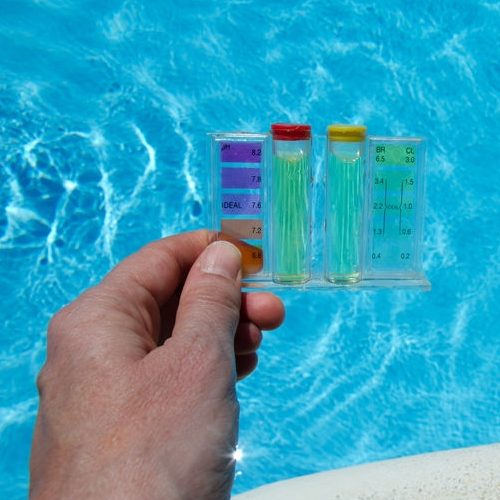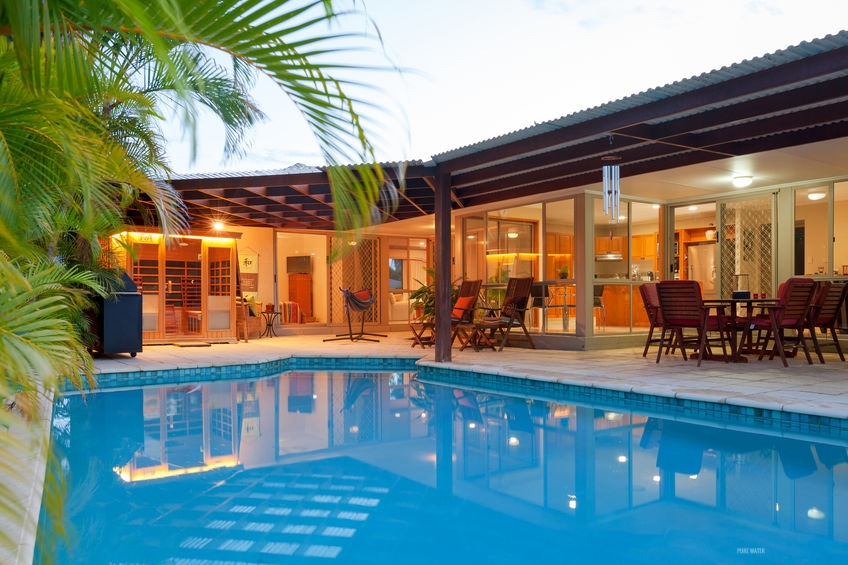
Water Treatment for Pool
Have you recently had your pool drained and refilled with water? If so, you will need do a little bit of pool water treatment in order to get the pool ready to swim in. What is swimming pool water treatment? In order for your pool to be clean and free of bacteria, algae, and other damaging substances, its important that your pool gets the proper water treatment. When it comes to pool water treatment for new pool water, you have to test the water to make sure its suitable for your pool. Your pool water has to to have a certain water balance so that it won’t ruin the surface of your pool, as well as work your pool’s chlorine. What you will need to do is test the water balance using test strips in a pool water test kit. The pH of your water needs to lie somewhere between 7.2 and 7.6. If the pH of your pool water is off, you can either add more chlorine or pH increaser if the pH is too low or you can add a pH decreaser if the pH is too high.
While the pH of your pool is really important, there are other chemicals that are needed in your pool. What chemicals are needed to maintain a pool? If you have a pool, you will also need to test the alkalinity, calcium hardness, chlorine, and cyanuric acid. To test all four, you will need to use a complete test kit. When it comes to your alkalinity, the total alkalinity needs to be between 80 and 120 ppm. If it’s too low you will use an alkalinity increaser and a pH decreaser if the levels are too high. For calcium hardness, it needs to be between 180 and 220 ppm. Just adjust those levels when they are too low, you can use a calcium hardness increaser. Pool water has pretty high levels of calcium hardness, so getting them higher is usually not an issue. The levels of cyanuric acid need to be between 30 and 50 ppm, but they will usually be at zero when the pool has freshly filled water. To raise the levels, you will use add a stabilizer. After all of the chemical levels have been checked and added, you will need to raise the chlorine levels. The fastest way to do this is to shock the pool, which just means adding more chlorine. Of course, if you use other water treatment options like ozone, bromine, or salt water, there will be other ways to treat your new pool water. To ensure your pool water treatment is done correctly, it’s important to call a professional.
Pool Water Treatment Options
In order to keep your pool protected against bacteria and slime, you need a good water treatment option. When it comes to pool water treatment, you have a couple of options to choose from.
- Bromine: If you are allergic to chlorine, bromine is a great alternative to chlorine. You don’t have to test your pool as much when you use bromine and the water balance should pretty much stay the same for longer periods of time. However, it isn’t best at oxidizing water and it is more expensive.
- Chlorine: The most popular pool water treatment it chlorine. It has the ability to remove algae, sanitize your pool, as well as oxidize it, plus it is affordable. Some people don’t like to use chlorine because it can irritate their skin, has a strong smell, and causes red eyes.
- Ionizers: Using copper and silver, an ionizer uses a low-voltage DC current to send these types of metals into the pool water. You don’t have to use much chlorine with this pool water treatment, and it’s good at attracting germs and bacteria that can be removed from the filter. This water treatment is more expensive.
- Ozone: This type of treatment uses a machine that is installed to the filtration line. It will then place ozone gas to kill pathogens. They require little chlorine and they don’t use a lot of electricity.
What Happens If I Put Too Much Chlorine in My Pool?
When you add too much chlorine to your pool, it can irritate your skin and eyes and in serious cases, it can exacerbate asthma and irritate your lungs. What can I use to stabilize my pool? If you have put too much chlorine in your pool, stop adding chlorine to your pool and leave your pool uncovered so the sun will remove some of the chlorine.
How Do I Balance My Pool Water?
The way that you balance out your pool water is to test and adjust the
alkalinity, adjust the pH, regulate the calcium hardness, and then sanitize the pool with your preferred pool water treatment.
How Often Should You Treat Your Pool?

Swimming Pool Water Treatment Contractors
In the summertime, you should be testing your pool at least two or three times a week, whereas in the winter you should test the pool once a week. If you notice that any of the levels are off, then you will need to perform pool water treatment. For homeowners who are looking for pool water treatment in Leander, TX, call Ozone Pure Water today! We offer a professional ozone treatment process to get your pool sanitized and protected. Just like you wouldn’t trust just anyone for deck staining, you shouldn’t just trust anyone to take care of your pool water treatment. Contact us at 800-633-8469 to make an appointment.
